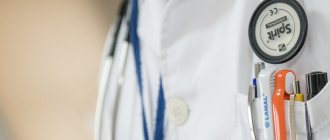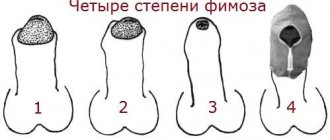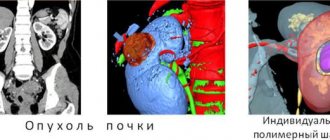Urologists-andrologists
Pediatric urologist-andrologist Viktor Vladimirovich Burkhanov Experience: 19 years
Pediatric urologist-andrologist Ustinov Pavel Nikolaevich Experience - 14 years
For patients aged 10 to 17 years, all medical services are provided free of charge.
Sign up for a consultation by phone.
Make an appointment with a pediatric urologist-andrologist in St. Petersburg
Childhood is the most tender period in the development of men's health. In order for the genitourinary system to develop correctly, without anomalies and pathologies, it is of great importance not only to consult a doctor in a timely manner, but also to choose a truly competent specialist.
In Medical you will find responsible, well-trained urologists and andrologists who have extensive work experience and are able to find an approach to children of different ages.
The clinic has modern equipment and advanced techniques that facilitate accurate diagnosis and prescribing adequate treatment therapy for adolescents and adults.
Friendly staff and a comfortable environment help relieve a small patient of stress, overcome embarrassment and overcome the fear of “people in white coats.”
Specialization of pediatric urologist-andrologist
A pediatric andrologist-urologist is a specialist involved in the observation, diagnosis and treatment of diseases of the reproductive system in children and adolescents under age. Separately, the doctor’s scope of competence includes monitoring the functions of the urinary system, since in males it is closely connected with the reproductive organs.
Typically, adult patients turn to an andrologist-urologist. But for children and teenagers, regular examinations by this specialist are also important. Thanks to a timely visit to an andrologist, it will be possible to avoid possible deviations in the development of the body and prevent pathologies of the male reproductive system.
The scope of this doctor's activity is limited not only to the external genitalia. The specialist is responsible for the health of the entire reproductive system, including internal systems and hormonal components. Additionally, the andrologist deals with the psychological problems of adolescents, which are often the main cause of erectile dysfunction and can affect other aspects of the patient’s intimate life.
At the same time, the pediatric andrologist urologist pays attention to the diagnosis and treatment of diseases of the kidneys and urinary system, conducts examinations and, if necessary, gives prescriptions for the correction of functions:
- ureters;
- Bladder;
- pelvis;
- renal calyces.
Pediatric urologist, andrologist, pediatric urologist-andrologist, surgeon. Children's clinic "Markushka"
Pediatric urologists, urologists-andrologists, urological surgeons at the children's clinic "Markushka" conduct preventive examinations (identifying pathologies of the genitourinary system in a child), prescribe and carry out timely treatment, perform surgical operations and treatment on an outpatient basis, visit children at home (calling a pediatric urologist on house).
When is it necessary to contact a pediatric urologist-andrologist in a clinic or call a pediatric urologist at home?
You should contact a pediatric urologist-andrologist if: - changes in urine tests are noted; — there are repeated episodes of fever without catarrhal symptoms; — the question arises: to open the foreskin or not to open it; - the child leaks urine; — the boy has no testicle in the scrotum; - the child complains of painful urination; - the child complains of pain in the scrotum, and in other cases indicating the possibility of pathology of the genitourinary system in the child.
What does a pediatric urologist treat most often?
The most common diseases of the kidneys and urinary tract in children.
Lower urinary tract infections (acute urethritis, acute and chronic cystitis). These diseases are more common in girls who have a shorter urethra. The cause may be vulvovaginitis, constipation, diarrhea, and diaper dermatitis. In boys, the disease is provoked by phimosis. In children 1.5-2 years old, the infection usually affects all parts of the urinary tract (cystopyelonephritis). Most often, urinary infection is diagnosed in children under 3 years of age.
Pyelonephritis . Infectious and inflammatory kidney disease. Most often occurs in the first 3-4 years of life and more often in girls. Caused by Escherichia coli and coccal flora. Accompanied by fever, pain in the lumbar region, vomiting, dry mouth. The urine becomes cloudy, contains protein, leukocytes or even blood, and a large number of microorganisms. The disease is dangerous with severe complications. Pyelonephritis can be acute or chronic.
Glomerulonephritis . A severe infectious-autoimmune (infectious-allergic) disease, the cause of which is a hereditary predisposition, when, after suffering from an acute respiratory viral infection or another infectious disease (sore throat, scarlet fever, influenza, etc.), disturbances in the immune system occur. The role of hepatitis B viruses, cytomegaloviruses, and parasitic diseases (for example, malaria) has been proven in the development of glomerulonephritis. The main symptoms are swelling in the child throughout the body, decreased urine output, red urine, increased blood pressure, headaches, nausea, and blurred vision.
Urolithiasis disease . Characterized by the formation of salt stones in the kidneys due to metabolic disorders. In recent years, this disease has become increasingly common in children due to poor environmental conditions, poor quality of food and water, an increase in general morbidity, uncontrolled long-term use of certain medications, as well as when the child has chronic pyelonephritis and nephropathies. It manifests itself as pain in the lumbar region, and when stones pass through the ureter, renal colic occurs.
Enuresis . Urinary incontinence often occurs at night. The cause may be immaturity of the child's central nervous system, shallow sleep, night terrors, freezing during sleep, or weakness of the bladder, polyuria, narrowing of the urethra, cystitis, phimosis, rickets. Even factors such as hypertrophy of the tonsils, dental caries, and worms can play a role in the appearance of enuresis.
Many other diseases . For example, hereditary nephropathies, tubulopathies, dysmetabolic nephropathy, etc.
Treatment by a pediatric urologist, urologist andrologist, is multidisciplinary and depends on the type and severity of the disease. Since the spectrum and origin of diseases of the kidneys, urinary tract, and reproductive system in children are extremely wide, only a pediatric urologist or urologist-andrologist can diagnose and prescribe adequate treatment.
When should you contact a pediatric urologist-andrologist?
Parents rarely turn to a pediatric andrologist for preventive examinations. Even when there are some signs of sexual problems in boys, adults believe that this can go away on its own, without outside help or diagnosis. In fact, this is a misconception. The intervention of a specialist is especially necessary when the following deviations in the health of boys are detected:
- foreign formations, protrusions on the scrotum;
- absence of one or two testicles, late descent of the testicles;
- in children after three years of age, the glans penis is closed, or it is only partially withdrawn;
- delayed puberty in adolescents over 14 years of age;
- painful or frequent urination;
- severe asymmetry or marked difference in testicular size;
- external location of the urethra;
- painful sensations in the lower abdomen or localized specifically in the area of the scrotum or penis;
- swelling or discoloration of the skin of the external genitalia;
- in children over five years of age, urinary incontinence does not depend on the time of day.
Timely andrological examination makes it possible to identify possible pathologies in the early stages, before the first symptoms, when parents do not even suspect the presence of pathology. Therefore, you need to visit a specialist not only for obvious signs of violations, but also for prevention, in order to control the boy’s male health. Particular attention should be paid to the child’s reproductive system in the first years of his life and during puberty.
Andrologist - what does this doctor treat?
List of diseases that require contacting an andrologist:
- Prostate adenoma is a disease that entails the proliferation of prostate tissue;
- prostatitis – inflammation of the prostate gland;
- phimosis is a disease in which the ring on the side of the foreskin narrows (it becomes difficult or completely impossible to remove the head of the penis);
- varicocele - dilation of the veins in the testicle (negatively affects the quality of sperm, therefore, can cause male infertility);
- metabolic syndrome - a number of pathologies that developed against the background of hormonal imbalance and metabolism);
- male menopause - the transition from puberty to weakening sexual function (due to a decrease in testosterone levels).
Andrologist consultation
Consultation with an andrologist is necessary when detecting and identifying the following pathologies and disorders:
- sexually transmitted diseases;
- male infertility, regardless of the reasons that led to it;
- prostate pathology;
- oncological diseases that affect the male genital organs;
- sexual dysfunction, which is considered a psychological and physiological problem;
- endocrine disorders associated with hormonal imbalance;
- external and internal defects in the genital area (androgenital surgery);
- physiological aging of the body in men, accompanied by disorders in the genitourinary system and cardiovascular activity (male menopause).
An andrologist treats the testicles, ureter, penis, urethra, prostate, bladder and urethra.
If the following problems occur, a consultation with an andrologist-urologist is necessary:
- when certain erectile dysfunction occurs;
- men whose partner, who does not have problems with reproductive function, cannot become pregnant for a long time;
- inflammation of the genital organs, accompanied by redness, painful urination, discharge from the urethra;
- with external changes in the pelvic organs, such as: protruding veins, modification of the shape of the scrotum, palpation of emerging tumors;
- before planning conception;
- preventive examinations to detect diseases in the early stages, in men aged 45-50 years.
Pediatric andrologist
There is also a children's direction in andrology. A pediatric andrologist is a specialist who deals with the characteristics of boys, namely: physiological, psychosexual, anatomical and endocrinological. Also, a pediatric andrologist deals with the prevention and treatment of the genital area.
Boys need to make an appointment with this specialist in the following cases:
- the appearance of neoplasms and uncharacteristic protrusions in the scrotum area;
- congenital or acquired (during the first year of life) pathology – undescended testicle;
- unnatural location of the urethra;
- disorders associated with the opening of the glans penis (in boys under 3 years of age);
- absence of signs that appear during puberty (in boys 13 years of age);
- the problem of excess weight, which arose due to improper production of male hormones;
- enuresis – urinary incontinence (at the age of 4 years);
- difficulty urinating;
- pain in the groin area and genitals;
- testicular asymmetry is observed.
Andrologist appointment
An appointment with an andrologist consists of the following stages:
- survey of existing health complaints, identification of symptoms and study of medical history;
- visual examination of internal organs, palpation of the prostate gland through the rectum;
- Based on the results of the appointment, the andrologist gives a referral for studies, such as: ultrasound, spermogram, urethral smear.
You should visit an andrologist regularly, starting with the onset of puberty in young people (from 12-16 years old).
Andrologist reviews
In the reviews, a huge number of patients express gratitude to andrologists for their quality service, skills, knowledge, kind attitude and qualified assistance in the fight against illnesses.
Clinic andrologist
Today there are many clinics that offer the services of an andrologist. The main thing is to go to a clinic in time, where highly qualified specialists work, who will correctly diagnose and select treatment methods for the disease. The patient himself chooses the medical center to which he is ready to go. In clinics in Moscow and St. Petersburg, in most cases, there is a paid appointment with an andrologist. Some clinics offer the first consultation with an andrologist free of charge, as well as online.
At the IVF Center clinic in Petrozavodsk, professional andrologists will provide qualified assistance to men, children and male adolescents and diagnose sexual dysfunction. Each patient at the IVF Center clinic in Petrozavodsk can count on an individual approach, high-quality treatment and complete confidentiality. If you have firmly decided to have offspring, to live a full and healthy life, the IVF Center clinic will help you adequately cope with the most difficult problem.
Routine examinations of children by a urologist-andrologist
As boys grow up, it is worth highlighting several periods when you need to pay special attention to the health of their reproductive system. It is advisable to carry out preventive examinations with a pediatric andrologist for boys of the following ages:
- 3 year old;
- 6 years old;
- 9 years old;
- 12 year old.
In children of this age group, the genitourinary system is actively developing and forming; during this process, anomalies and various pathologies can be observed. Often the child does not even realize that not everything is in order with his health, since certain diseases occur without external manifestations. Thanks to regular visits to a pediatric andrologist, the doctor will be able to timely diagnose such dangerous diseases as:
- inguinal hernia;
- phimosis;
- cryptorchidism;
- underdevelopment of the penis or testicles and other abnormalities of the reproductive system.
Upon reaching the age of 14, examinations by an andrologist should be regular. It is during this period that puberty occurs, and it is important to promptly identify possible deviations in the development of the genitourinary system and promptly take corrective measures to avoid complications. After all, some of them can be very serious, for example, varicocele or testicular cysts, hypogonadism and others.
When a teenager crosses the threshold of adulthood, he is treated by an andrologist who works with adult patients.
Doctor - pediatric andrologist
A pediatric urologist-andrologist deals with the diagnosis and treatment of diseases of the child’s reproductive system, urinary tract, and kidney diseases.
A good pediatric andrologist uses numerous instrumental methods for examination and effective diagnosis, as well as treatment of children suffering from genitourinary diseases. A professional pediatric andrologist surgeon and urologist-andrologist works closely with pediatric doctors of other specializations.
Pediatric surgeon-andrologist, urologist-andrologist in our clinic
A pediatric andrologist in our clinic provides diagnostics, treatment, and management of boys from newborn age.
At an appointment with a pediatric andrologist in our clinic, you can receive detailed information on all issues related to the sexual development of a boy. Our specialists will give you competent knowledge about the development of the children's reproductive system. In addition, our pediatric andrologist surgeon will talk in detail about all kinds of diseases of the genitourinary system, the possible causes of their occurrence, as well as timely methods of diagnosis, treatment, and prevention, which is especially important. Usually, untimely, absent or low efficiency of diagnosis and subsequent treatment causes such sad consequences as weak erection, impotence, infertility and other disorders. Boys who have pathologies need special attention, since timely medical care will enable the child to grow into a socially adapted and healthy individual. Responsibility for children's health always lies on the shoulders of parents, who need to pay due attention to the hygiene and physiology of the children's genitourinary system.
At what age should a boy be shown to a pediatric andrologist?
This question is quite relevant. A pediatric andrologist can diagnose some pathologies from the first days of a baby’s life. At that time, dropsy, scrotal and inguinal hernia, spermatic cord cyst, balanoplastitis and other forms of congenital anomalies can be detected. It should be noted that any form of disorder is best treated at an early stage of development. It is also extremely important to understand that it is better for any interventions on children’s genitourinary organs to be carried out on a boy before puberty. It is for this reason that special attention should be paid to diagnostics at the age of 5-6 years. It is better to think about the future health of the boy even when he is just born. A pediatric andrologist surgeon will provide all the necessary knowledge for normal child development.
When should you go to a pediatric urologist-andrologist?
- the presence of physiological dropsy of the testicular membranes, physiological mastitis of the newborn;
- “borderline” physiological states of the newborn;
- surgery for phimosis;
- absence of testicles in the scrotum (cryptorchidism), varicocele, hempospadias;
- hydrocele of the testicular membranes, enlargement of the scrotum;
- the presence of changes in the bladder and kidneys on ultrasound, changes in urine analysis.
In our clinic, the pediatric andrologist uses the most modern diagnostic techniques:
- Laboratory diagnostics: assessing general health (general clinical urine and blood tests, immunological and biochemical studies);
- identification of hormonal status, as well as the level of thyroid hormones, sex hormones, pituitary gland, adrenal glands);
- identification of immune status (assessment of humoral and cellular immunity);
- unique studies of the biocenosis of the urogenital tract using real-time PCR;
- a comprehensive study aimed at identifying all forms of infections using ELISA, PCR, virological, microscopic, and bacteriological research methods;
- carrying out early diagnosis of oncological diseases of the urinary system.
- Diagnosis using ultrasound.
- A pediatric andrologist performs X-ray diagnostics using modern X-ray equipment.
- Urethroscopy.
- Cytoscopy.
- In difficult situations, a pediatric andrologist may prescribe magnetic resonance imaging or computed tomography. These are modern examination methods, which are highly informative, accurate, and painless.
Treatment by a pediatric andrologist, andrologist surgeon, and urologist-andrologist is multidisciplinary and usually depends on the severity and type of disease. Since the origin and spectrum of diseases of the reproductive system, urinary tract and children are extremely extensive, only a professional pediatric andrologist can carry out timely diagnosis and prescribe the most adequate course of treatment.
How is an appointment with a pediatric urologist andrologist?
Adolescents under 15 years of age visit a specialist in the presence of their parents. After reaching the age of 15, a guy can come to an appointment either with his parents or without adults: he is already able to bear legal responsibility for his health, and provisions on non-disclosure of medical information apply to him.
First of all, the specialist asks the patient about his complaints. During the conversation, the doctor receives information that will help further determine the nature of the problem, the intensity of its manifestation, the symptoms that are bothering the child, and their duration.
Having collected the necessary information about the patient’s condition, the doctor proceeds to examine the child, performing palpation and visual examination of the external genitalia and abdomen. To prevent the boy from experiencing discomfort and embarrassment, parents should talk to the child before the visit, explain the importance of these actions, reassure him and assure him that the child is not in danger.
Based on the initial examination and characteristic symptoms, the urologist can immediately identify the problem and prescribe treatment, or refer the patient for additional examination to clarify the diagnosis. The results of the examination, medical report, recommendations - all this is entered into the patient’s outpatient record, which is kept in the clinic. A copy of the statement is also given to the boy's parents, guardians or other legal representatives. If there is a need for additional examination, the doctor writes out the appropriate directions. Usually we are talking about donating blood for analysis and undergoing an ultrasound examination (ultrasound).
On average, an appointment with a pediatric andrologist lasts no more than 20-30 minutes. When there is a need for additional manipulations, the time increases.
How does a consultation with a pediatric urologist proceed?
The doctor will listen to the parents' story about the health problem that has arisen and, if possible, question the child. If a congenital disease of the genitourinary system is suspected, he will find out how the mother’s pregnancy and childbirth proceeded, ask parents about chronic family diseases, behavioral characteristics and development of the baby.
Next, the urologist will examine the child, focusing on the abdomen, pelvis, and external genitalia. The examination will be gentle and not scary even for the shyest child. During the examination, the doctor will examine the child’s back to check for spinal deformities and palpate the abdomen. The specialist will also examine the little patient's genitals to make sure everything is formed and functioning properly. Depending on the results of the examination, the pediatric urologist may prescribe additional examinations: tests, consultations with other specialists (including at home). For differential diagnosis, consultations with the following specialists may be required: surgeon, ultrasound specialist, gastroenterologist, nephrologist, cardiologist, endocrinologist.
As a result of the examination, the urologist will diagnose the child, prescribe treatment, write out the necessary prescriptions and give recommendations. Will open a sick leave (temporary disability certificate) for one of the parents and issue the necessary certificates for the child.
The treatment and monitoring plan will be discussed with parents, who will have the opportunity to ask questions and leave with an understanding of your child's condition and the doctor's recommendations. The pediatric urologist will also advise on the proper development of the child, disease prevention, offer classes in physical therapy, aquatherapy and swimming, and, if necessary, prescribe physical therapy.











